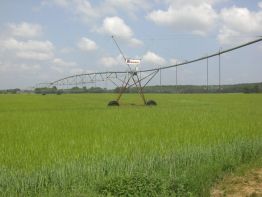Project Aim
The main aim of the No Regret project was to study different aspects of water shortage and drought that are important to the North Sea Region. Four European countries have worked together to bring water shortage and its impact on land use on the political agenda.
Project implementation and results
Activities
Within the No Regret project each partner developed local integrated strategies by researching various measures to improve the availability of fresh water. Different sources of fresh water were researched for the use of drinking water, water for nature, water for urban development and water for agriculture. Several pilot projects were carried out in the field of water management for agriculture under water shortage conditions.
Joint transnational strategy
Mode of cooperation
All partners worked in three theme groups on uncertainties of water uses and learned how to incorporate their knowledge in the development of strategies and measures. The transfer of experiences resulted in unexpected solutions and was a great success. The general public, politicians and stakeholders contributed to the No Regret project and are disseminating the subject of water shortage.
Impact of the project
Long-term achievements
The study on water shortages in the Netherlands will continue after the official end of the project. The amount of water, which is needed for all functions under extreme dry conditions, will be quantified together with the Dutch Northern provinces and water boards. The monitoring of groundwater and of effects of measures will be continued and small scale measures will be stimulated.
Policy shaping
The project succeeded in influencing policy-makers on regional and national level. For instance, the project arranged several 'high stakeholder' meetings in terms of providing information on the most recent results of climate research and shedding light on the need and possibilities for adapting the planning and management of aquifers in Denmark to the expected consequences of climate change. The meetings contributed to a common understanding of the new challenges with respect to climate change for water planning in the near future.
The survey and mapping of potential drinking water resources in Vendsyssel, Denmark, has increased the background knowledge and has been an essential contribution to the implementation of the Water Framework Directive. After the re-organisation of the administrational structure in Denmark, the No Regret activities in Vendsyssel became part of the national water management plans. In that perspective the survey and mapping in Vendsyssel has been an additional output of the project.
Based on the results of the No Regret project and the national drought study, the Province of Fryslân and the water authority have formulated a strategy for water shortages for the 2010 - 2015 period and incorporated that strategy in new water policy plans for that period. In Germany, a practical implementation and research project as follow-up is in consideration. A five year moratorium on the allowed amount of water abstraction is agreed upon by the water administration in order to gain time to find specific solutions and for political and public discussion about water shortage. The Ministry of Environment of Lower Saxony agreed on co-financing a more specific follow-up project in the identified intensive problem area.
Thus, No Regret has contributed to put water shortage as part of policy-making and is now on the political agenda around the North Sea Region. |

Water shortage and drought: centre pivot watering in the field of agriculture, Germany
Partners Ministerie van de Vlaamse Gemeenschap, Water Division, BE
North Jutland County Council, DK
Landwirtschaftskammer Hannover / Agricultural Chamber of Hannover, DE
Province of Fryslân, NL
LP:
Province of Groningen
Project Manager
Mirjam Bakker and Dorine Trans
DHV B.V.
P.O. Box 1132 NL-3818 BC Amersfoort
The Netherlands
m.bakker@provinciegroningen.nl d.trans@provinciegroningen.nl
www.noregret.info
Tel: +31 50 316 4179
Measure: 4.2
Start Date: 30 November 2004
End Date: 30 June 2008
ERDF Grant:
 1.780.235,00 1.780.235,00
Total Eligible Sum:
 3.560.470,00 3.560.470,00
|